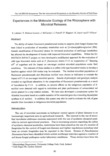Experiences in the Molecular Ecology of the Rhizosphere with Microbial Releases.
JIRCAS international symposium series
| ISSN | 13406108 |
|---|---|
| 書誌レコードID(総合目録DB) | AA1100908X |

本文フルテキスト
intlsymp-5_91-100.pdf333.2 KB
The ability of certain fluorescent pseudomonad strains to suppress plant fungal diseases has been linked to production of secondary metabolites such as 2,4-diacetylphloroglucinol (Phl). Genetic modification of biocontrol strains for increased production of antifungal metabolites has allowed the development of strains with improved biocontrol capabilities. Within the EU BIOTECH IMPACT project we have developed a multifaceted approach for the evaluation of wild type biocontrol strain such as P.fluorescens strains F113 on suppression of "damping off'' of sugarbeet and the impact on non-target resident microbial populations under field conditions. The rationale of these studies is to utilize wild type biocontrol strains to develop a baseline against which GM strains may be evaluated. The resident microbial populations of fluorescent pseudomonads and Rhizobium meliloti were chosen as indicators to evaluate the impact of F113 on non-target microbial species. Results of phenotypic and genotypic analysis revealed no significant alterations in the composition of fluorescent pseudomonads as a result of inoculation by F113. In addition, no adverse effects on the indigenous population of R.meliloti were detected with regard to nodulation and plant performance of uninoculated red clover planted in a crop rotation scheme. We have also developed a containment system for rhizobial inoculants based on a stable mutation of the essential gene thyA encoding thymidylate synthase in R. meliloti. In addition, this system may also be used to evaluate the risk of gene transfer from inoculants to indigenous microbial populations.
| 作成者 | S. Lohrke Y. Moenne-Loccoz J. McCarthy J. Powell P. Higgins H. Joyce F. O'Gara |
|---|---|
| 公開者 | Japan International Research Center for Agricultural Sciences |
| オンライン掲載日 | |
| 号 | 5 |
| 開始ページ | 91 |
| 終了ページ | 100 |
| 言語 | eng |
